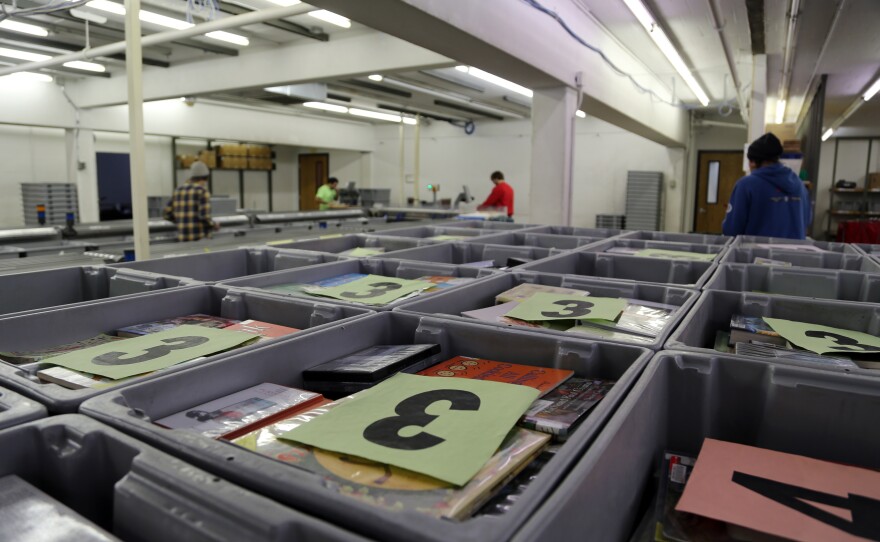Two part-time workers stood on either side of a T-shaped conveyer belt as 61-year-old Joe Spaniol moved down its twin trunks, trading full boxes with empty ones when its contents started to overflow.
He thumbed the barcode on a crinkled copy of Woman’s Day magazine.
Essential Pittsburgh is our ongoing series about how Pittsburgh lives, and how the city is evolving.
"This ain't bad," he said, tossing it in a hamper. "Before the machine, we had a constant pileup. Boxes everywhere. We never stopped."
Each box represents a library. Some libraries see a lot more action than others.
The Carnegie Library of Pittsburgh lends and tracks more than 8 million items all over Allegheny County. Tons of books, but also music, TV series, movies, baby dolls, air quality monitors, musical instruments, podcasting equipment and more. Some of those materials – like the recording tools – are pretty new to the library. But the way it gets to Pittsburgh consumers is very, very old.
"Actually the technical services part has been here in a way since ... 1895," said Tina LaMark, the library system's assistant director of technical services. "There was always the need to order, to process, to catalog materials. They did it very manually, of course. There used to be the card catalog. They would type cards. They would put cards in the catalog for people to use. And, of course, now everything is done in the computer environment."
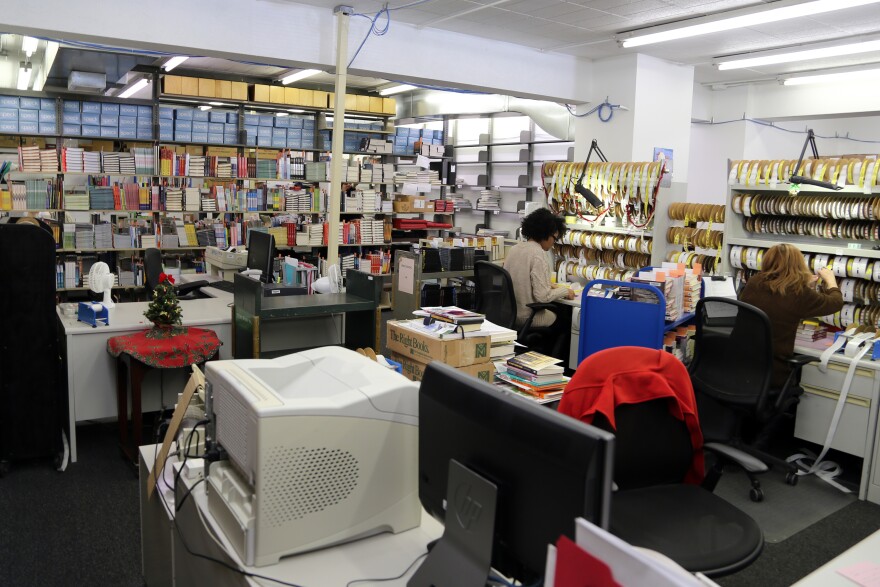
Collection coordinator Sarah Beasley lives in that computer environment. She said the collection and circulation of library materials has grown exponentially in the last five years, not long after CLP became the repository for a shared cataloging network that ships roughly 4 million items around about 71 locations.
Beasley said "about" because that number changes. The local system includes 19 officially branded "Carnegie Libraries of Pittsburgh," plus 45 independent library systems and their branch locations. A lot of them bear the Carnegie name, too.
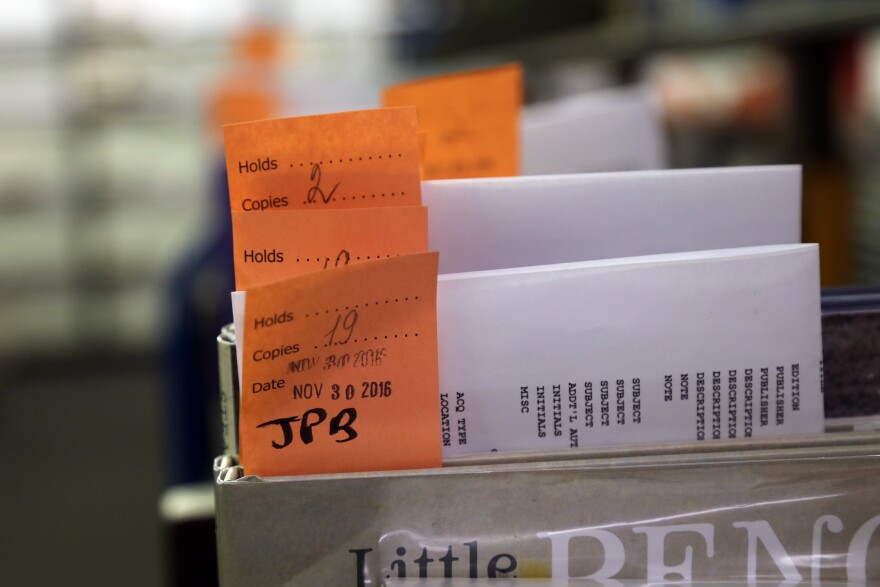
"It is confusing," LaMark said. "We're all independent libraries, part of this consortium. So we share a library catalog so all of the materials that we offer go into the same library catalog. And really, the goal of that shared catalog was so that people didn't have to know the difference. We want it to be seamless and easy for our customers."
Beasley and her team are constantly investigating new and existing books to decide how many of each title the library's patrons might need. They factor in information from dozens of sources: past performance data, industry sites, publishing blogs, Top 10 lists, advance reading copies, suggestions from users and employees and professional reviews.
"Not necessarily to make sure that it's got good reviews, but just to get a sense of what the content is," she said.
Orders to vendors are made almost daily, with shopping lists ranging from 10 to 140 items. For e-resources, a committee decides. Other goodies come in and out of the catalog as they become available.

Beasley said it’s a careful science. If expectations for a book are low, they order just a few, and maybe buy more later. For bestsellers and guaranteed crowd pleasers from authors like James Patterson, Danielle Steele or Janet Ivanovich, they start with at least 100.
Harry Potter and the Deathly Hallows, J.K. Rowling’s seventh and final title in the wildly popular children’s series, set library records. They ordered more than 800 copies, and many of those were on library shelves the moment they hit commercial bookstores.
"So it used to be that there might be a little bit of a delay, and that's not true anymore," Beasley said. "We now have access to make our selections three to six months typically in advance of when the publication date comes out."
Whatever the material -- book, CD, movie or instrument -- if it’s popular, it always finds its way back to the CLP’s West End warehouse. Books spill out of hundreds of gray plastic bins and hulking vinyl spring-loaded laundry hampers in neat rows across the warehouse's concrete expanse.

Spaniol, of North Fayette, started with CLP nearly 32 years ago, well before its beloved Bookmobile -- which he still sometimes drives -- and the automated sorter that's more than quadrupled their ability to move items to and from library locations.
August Rolin, 48, pulled over a stack of books and placed one under a red laser that reads where the book belongs. Many make their way home to get tucked back into their regular shelves. If there’s a request from a reader, it’s flagged as a “held” book and directed toward that patron’s pickup location.
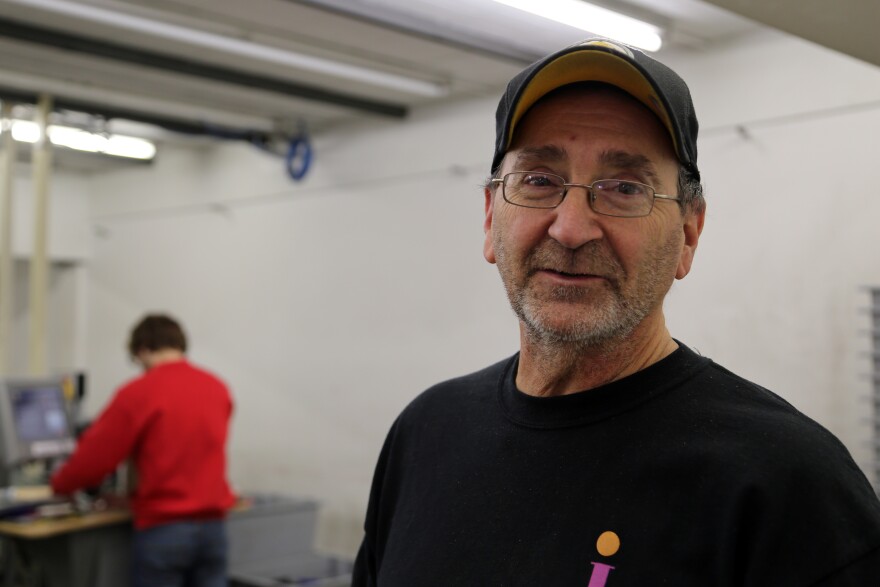
LaMark points to various number- and color-coded stacks.
"You can see the finished ones along the wall," she said. "And we do some hand sorting over there."
The most popular books are the ones that spend the most time in transit. Beasley and her team are pretty good at predicting interest, but they do encounter sleepers. Colston Whitehead’s Underground Railroad made gobs of year-end "best of" lists. Game of Thrones was popular when it debuted in 1996, but over time, the library sold off copies to account for waning demand. Then the HBO series premiered, and it topped their wait lists again.
Oprah Winfrey’s selections are game changers. So are current events.
J.D. Vance's Hillbilly Elegy continues to gain momentum, Beasley said, especially since November when Donald Trump won the presidency.
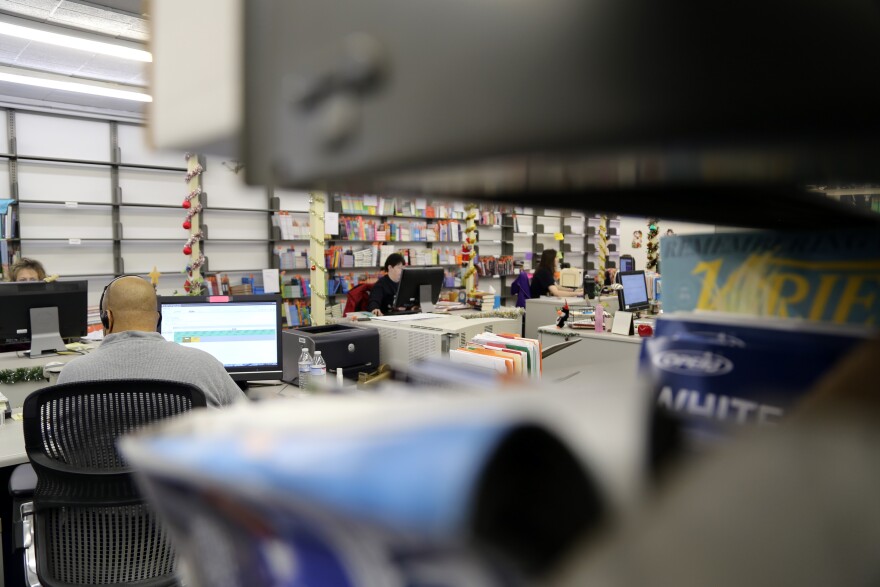
"Not only did it get great reviews, so we knew to get copies to begin with, but then it continued to get a lot of press attention," she said. "We have bought additional copies on several occasions."
Librarians in the West End get to play not only the kids under the Christmas tree, but also Santa Claus sharing his bounty.
“It is really fun to open that box and see all these new shiny, beautiful books or DVDs, and then for each of our locations, they get a big bin of new materials, too,” Beasley said. “So hopefully they also feel an excitement every time they come into the library because there's new stuff for them.”


